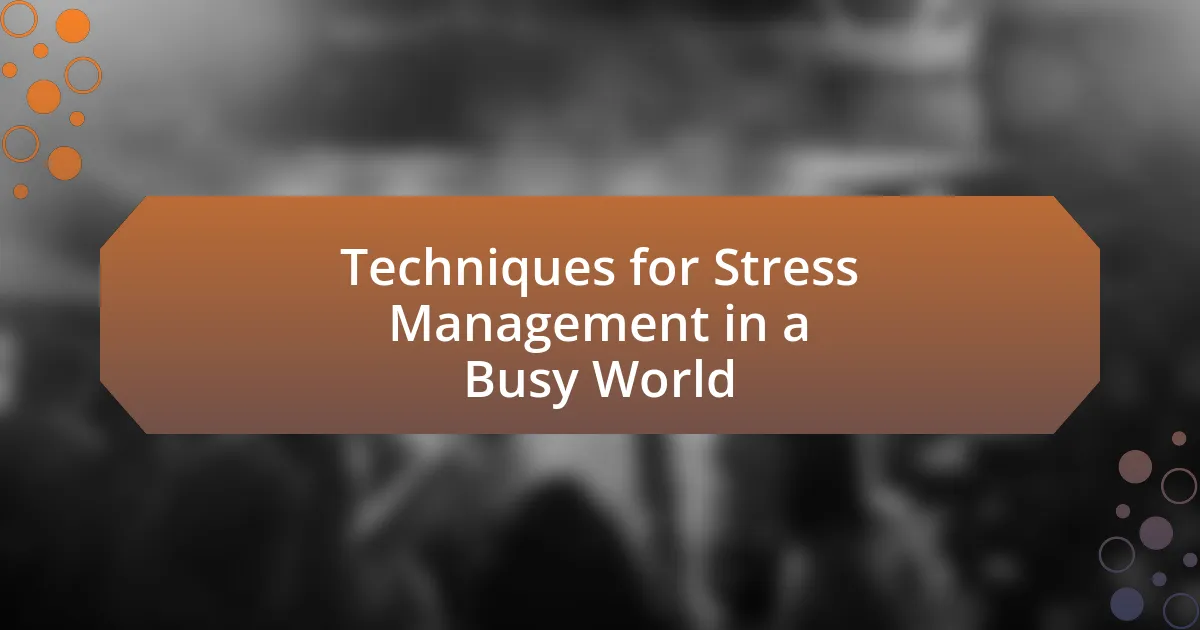The article focuses on effective techniques for stress management in today’s fast-paced environment. It highlights key strategies such as mindfulness meditation, time management, physical exercise, and the importance of social support. The discussion includes specific mindfulness practices, the role of physical activity in reducing stress, and various time management techniques that enhance productivity and control. Additionally, it addresses psychological approaches like cognitive-behavioral therapy and emphasizes the significance of nutrition, hydration, and sleep in managing stress levels. Overall, the article provides a comprehensive overview of practical methods to improve well-being and resilience against stress.

What are the key techniques for stress management in a busy world?
Key techniques for stress management in a busy world include mindfulness meditation, time management, physical exercise, and social support. Mindfulness meditation has been shown to reduce stress levels by promoting relaxation and enhancing emotional regulation, as evidenced by a study published in the journal “Health Psychology” which found that participants who practiced mindfulness reported lower stress levels. Effective time management techniques, such as prioritizing tasks and setting realistic goals, can help individuals feel more in control and less overwhelmed, supported by research from the American Psychological Association indicating that better time management correlates with reduced stress. Regular physical exercise is also a proven stress reliever; the Mayo Clinic reports that exercise increases the production of endorphins, which improve mood and reduce stress. Lastly, maintaining strong social support networks can buffer against stress, as highlighted in a study by Cohen and Wills in “Psychological Bulletin,” which found that social support significantly mitigates the effects of stress.
How can mindfulness practices help in stress management?
Mindfulness practices help in stress management by promoting awareness and acceptance of the present moment, which reduces anxiety and enhances emotional regulation. Research indicates that mindfulness meditation can decrease levels of the stress hormone cortisol, leading to improved mental health outcomes. A study published in the journal “Psychosomatic Medicine” found that participants who engaged in mindfulness-based stress reduction reported significant reductions in stress and anxiety levels compared to control groups. This evidence supports the effectiveness of mindfulness practices in managing stress in a busy world.
What specific mindfulness techniques can be applied daily?
Specific mindfulness techniques that can be applied daily include mindful breathing, body scan meditation, and mindful walking. Mindful breathing involves focusing on the breath, inhaling and exhaling slowly to promote relaxation and awareness. Body scan meditation entails mentally scanning the body for tension and consciously relaxing each part, which enhances body awareness and reduces stress. Mindful walking encourages individuals to pay attention to the sensations of walking, such as the feeling of the ground beneath their feet, fostering a connection to the present moment. Research indicates that these techniques can significantly lower stress levels and improve overall well-being, as evidenced by studies published in journals like “Mindfulness” and “The Journal of Positive Psychology.”
How does mindfulness impact overall well-being?
Mindfulness significantly enhances overall well-being by promoting emotional regulation, reducing stress, and improving mental clarity. Research indicates that mindfulness practices, such as meditation and focused breathing, can lower cortisol levels, which are associated with stress. A study published in the journal “Psychological Science” by Zeidan et al. (2010) found that just a few sessions of mindfulness meditation can lead to improvements in attention and cognitive flexibility. Additionally, mindfulness fosters a greater sense of self-awareness and acceptance, which contributes to better emotional health and resilience against anxiety and depression.
What role does physical activity play in managing stress?
Physical activity plays a crucial role in managing stress by reducing levels of stress hormones and increasing the production of endorphins, which are natural mood lifters. Engaging in regular exercise has been shown to lower anxiety and depression, as evidenced by a study published in the Journal of Clinical Psychiatry, which found that individuals who participated in physical activity reported significantly lower stress levels compared to sedentary individuals. Additionally, physical activity promotes better sleep, enhances self-esteem, and provides a distraction from daily stressors, further contributing to its effectiveness in stress management.
Which types of exercise are most effective for stress relief?
Aerobic exercises, such as running, swimming, and cycling, are most effective for stress relief. These activities increase the production of endorphins, which are natural mood lifters. Research published in the Journal of Clinical Psychiatry indicates that regular aerobic exercise can significantly reduce symptoms of anxiety and depression, contributing to overall stress reduction. Additionally, yoga and mindfulness-based exercises have been shown to lower cortisol levels, the hormone associated with stress, further supporting their effectiveness in managing stress.
How often should one engage in physical activity for optimal stress management?
To achieve optimal stress management, one should engage in physical activity at least 150 minutes per week, which translates to about 30 minutes on most days. This recommendation is supported by the American Heart Association, which states that regular physical activity can significantly reduce stress levels by promoting the release of endorphins, improving mood, and enhancing overall mental well-being. Engaging in such a routine not only helps in managing stress but also contributes to better physical health, creating a holistic approach to stress management.
How can time management strategies reduce stress levels?
Time management strategies can significantly reduce stress levels by providing individuals with a structured approach to prioritize tasks and allocate time effectively. When people utilize techniques such as to-do lists, scheduling, and setting deadlines, they gain a clearer understanding of their responsibilities, which minimizes feelings of overwhelm. Research indicates that effective time management can lead to a 25% increase in productivity, allowing individuals to complete tasks more efficiently and with less anxiety. By reducing procrastination and enhancing focus, these strategies create a sense of control over one’s workload, ultimately leading to lower stress levels.
What are the most effective time management techniques?
The most effective time management techniques include the Pomodoro Technique, prioritization using the Eisenhower Matrix, and time blocking. The Pomodoro Technique involves working in focused intervals of 25 minutes followed by a 5-minute break, which enhances concentration and reduces burnout. Prioritization through the Eisenhower Matrix helps individuals categorize tasks based on urgency and importance, allowing for better decision-making on what to tackle first. Time blocking involves scheduling specific blocks of time for different activities, which can improve focus and productivity by minimizing distractions. These techniques are supported by research indicating that structured approaches to time management can lead to increased efficiency and reduced stress levels.
How does prioritizing tasks influence stress levels?
Prioritizing tasks significantly reduces stress levels by providing clarity and focus on what needs to be accomplished. When individuals prioritize, they can allocate their time and energy to the most important tasks first, which minimizes feelings of overwhelm and anxiety associated with unstructured workloads. Research indicates that effective task prioritization leads to improved time management and productivity, which are directly linked to lower stress levels. For instance, a study published in the Journal of Occupational Health Psychology found that employees who utilized prioritization techniques reported a 25% decrease in stress-related symptoms compared to those who did not prioritize their tasks. This demonstrates that prioritizing tasks not only enhances efficiency but also plays a crucial role in managing stress effectively.

What are the psychological approaches to stress management?
Psychological approaches to stress management include cognitive-behavioral therapy (CBT), mindfulness-based stress reduction (MBSR), and acceptance and commitment therapy (ACT). CBT focuses on identifying and changing negative thought patterns that contribute to stress, which has been shown to reduce anxiety and improve coping strategies (Hofmann et al., 2012). MBSR emphasizes mindfulness meditation and awareness techniques to help individuals manage stress by staying present and reducing rumination, supported by research indicating its effectiveness in lowering stress levels (Kabat-Zinn, 1990). ACT encourages individuals to accept their thoughts and feelings rather than fighting them, promoting psychological flexibility and resilience, with studies demonstrating its efficacy in improving mental health outcomes (Hayes et al., 2006).
How does cognitive-behavioral therapy (CBT) assist in stress management?
Cognitive-behavioral therapy (CBT) assists in stress management by helping individuals identify and modify negative thought patterns and behaviors that contribute to stress. CBT techniques, such as cognitive restructuring, enable individuals to challenge irrational beliefs and replace them with more constructive thoughts, leading to reduced anxiety and improved coping strategies. Research indicates that CBT can significantly lower stress levels; for instance, a meta-analysis published in the journal “Psychological Bulletin” found that CBT is effective in reducing stress and anxiety symptoms across various populations.
What are the core principles of CBT related to stress?
The core principles of Cognitive Behavioral Therapy (CBT) related to stress include the identification of negative thought patterns, the challenge of these thoughts, and the development of coping strategies. CBT posits that stress is often exacerbated by distorted thinking, such as catastrophizing or overgeneralizing. By recognizing and reframing these thoughts, individuals can reduce their stress levels. Research indicates that CBT effectively decreases stress and anxiety, as evidenced by a meta-analysis published in the Journal of Consulting and Clinical Psychology, which found that CBT significantly improves stress management outcomes across various populations.
How can individuals implement CBT techniques in their daily lives?
Individuals can implement Cognitive Behavioral Therapy (CBT) techniques in their daily lives by practicing thought monitoring, cognitive restructuring, and behavioral activation. Thought monitoring involves keeping a journal to track negative thoughts and identifying patterns that contribute to stress. Cognitive restructuring helps individuals challenge and reframe these negative thoughts into more positive and realistic ones, thereby reducing anxiety and improving mood. Behavioral activation encourages individuals to engage in activities that bring joy or a sense of accomplishment, which can counteract feelings of depression and stress. Research indicates that these techniques can significantly improve mental health outcomes, as evidenced by a meta-analysis published in the journal “Psychological Bulletin,” which found that CBT is effective in reducing symptoms of anxiety and depression across diverse populations.
What is the significance of social support in managing stress?
Social support is crucial in managing stress as it provides emotional, informational, and practical assistance, which can significantly reduce stress levels. Research indicates that individuals with strong social support networks experience lower levels of anxiety and depression, as well as improved coping strategies during stressful situations. For instance, a study published in the Journal of Health and Social Behavior found that social support can buffer the effects of stress by promoting a sense of belonging and enhancing resilience. This demonstrates that social connections not only help individuals feel understood and valued but also facilitate access to resources that can aid in stress management.
How can building a support network alleviate stress?
Building a support network can alleviate stress by providing emotional, informational, and practical assistance. When individuals connect with friends, family, or community groups, they gain access to resources that can help them navigate challenging situations. Research indicates that social support is linked to lower levels of stress and improved mental health outcomes. For example, a study published in the Journal of Health and Social Behavior found that individuals with strong social ties reported lower levels of perceived stress and better coping strategies. This demonstrates that a robust support network can serve as a buffer against stressors, enhancing resilience and overall well-being.
What are effective ways to strengthen social connections?
Effective ways to strengthen social connections include engaging in regular face-to-face interactions, participating in community activities, and utilizing technology for communication. Research indicates that consistent social engagement can enhance emotional well-being and reduce stress levels. For instance, a study published in the journal “Psychological Science” found that individuals with strong social ties reported lower levels of stress and higher life satisfaction. Additionally, volunteering or joining clubs can foster new relationships, further reinforcing social networks.

What lifestyle changes can enhance stress management?
Regular physical activity enhances stress management by reducing levels of the body’s stress hormones, such as adrenaline and cortisol, while simultaneously stimulating the production of endorphins, which are natural mood lifters. Studies indicate that engaging in at least 150 minutes of moderate aerobic exercise weekly can significantly lower stress levels and improve overall mental health. Additionally, adopting a balanced diet rich in fruits, vegetables, whole grains, and lean proteins supports brain health and stabilizes mood, further aiding in stress reduction. Mindfulness practices, such as meditation and yoga, have also been shown to decrease stress by promoting relaxation and enhancing emotional regulation. Research published in the Journal of Health Psychology found that individuals who practiced mindfulness reported lower stress levels and improved coping strategies. Prioritizing adequate sleep is crucial, as sleep deprivation can exacerbate stress and negatively impact cognitive function; the National Sleep Foundation recommends 7-9 hours of quality sleep per night for optimal health. Lastly, fostering strong social connections provides emotional support, which is vital for managing stress effectively, as evidenced by studies showing that social interactions can buffer against stress-related health issues.
How does nutrition impact stress levels?
Nutrition significantly impacts stress levels by influencing the body’s physiological responses and mental health. A balanced diet rich in vitamins, minerals, and omega-3 fatty acids can reduce the production of stress hormones like cortisol. For instance, studies have shown that diets high in fruits, vegetables, and whole grains are associated with lower levels of anxiety and depression, which are closely linked to stress. Additionally, specific nutrients such as magnesium and B vitamins play crucial roles in regulating mood and stress responses. Research published in the journal “Nutrients” indicates that inadequate intake of these nutrients can lead to increased stress and anxiety levels.
What foods are beneficial for reducing stress?
Foods that are beneficial for reducing stress include fatty fish, dark chocolate, nuts, seeds, and leafy greens. Fatty fish, such as salmon and mackerel, are rich in omega-3 fatty acids, which have been shown to lower stress hormone levels and improve mood. Dark chocolate contains flavonoids that can enhance mood and reduce stress by promoting the release of endorphins. Nuts and seeds provide magnesium, which helps regulate cortisol levels, a hormone associated with stress. Leafy greens, like spinach and kale, are high in folate, which supports serotonin production, contributing to improved emotional well-being. These foods collectively support the body’s ability to manage stress effectively.
How can hydration influence stress management?
Hydration significantly influences stress management by maintaining optimal physiological function and cognitive performance. Adequate water intake helps regulate cortisol levels, the primary stress hormone, thereby reducing feelings of stress and anxiety. Research indicates that even mild dehydration can impair mood and increase perceptions of stress, as shown in a study published in the Journal of Nutrition, which found that participants with lower hydration levels reported higher levels of tension and fatigue. Thus, staying properly hydrated is essential for effective stress management.
What are the benefits of adequate sleep for stress management?
Adequate sleep significantly enhances stress management by improving emotional regulation and cognitive function. Research indicates that sufficient sleep helps to lower cortisol levels, the hormone associated with stress, thereby reducing overall stress responses. A study published in the journal “Sleep” found that individuals who consistently get 7-9 hours of sleep per night report lower levels of perceived stress and better coping mechanisms during stressful situations. Furthermore, adequate sleep fosters resilience, allowing individuals to handle stressors more effectively, as evidenced by findings from the National Sleep Foundation, which highlight the correlation between sleep quality and mental health.
How much sleep is necessary for optimal stress relief?
Seven to nine hours of sleep per night is necessary for optimal stress relief. Research indicates that adequate sleep helps regulate mood and stress levels, with studies showing that individuals who consistently get this amount of sleep report lower stress and better emotional resilience. For instance, a study published in the journal “Sleep” found that insufficient sleep is linked to increased stress and anxiety levels, highlighting the importance of quality sleep in managing stress effectively.
What strategies can improve sleep quality?
To improve sleep quality, individuals can implement strategies such as establishing a consistent sleep schedule, creating a relaxing bedtime routine, and optimizing the sleep environment. Research indicates that maintaining a regular sleep-wake cycle helps regulate the body’s internal clock, leading to better sleep quality. A study published in the journal Sleep found that individuals who adhered to a consistent sleep schedule experienced improved sleep efficiency and reduced insomnia symptoms. Additionally, engaging in calming activities before bed, such as reading or meditation, can enhance relaxation and facilitate easier sleep onset. Furthermore, optimizing the sleep environment by ensuring a dark, quiet, and cool room can significantly contribute to better sleep quality, as supported by findings from the National Sleep Foundation, which emphasize the importance of a conducive sleep setting.
What practical tips can individuals implement for effective stress management?
Individuals can implement several practical tips for effective stress management, including regular physical activity, mindfulness practices, and time management techniques. Engaging in physical exercise, such as walking or yoga, has been shown to reduce stress hormones and improve mood, as supported by a study published in the Journal of Clinical Psychiatry, which found that exercise can significantly alleviate symptoms of anxiety and depression. Mindfulness practices, such as meditation and deep-breathing exercises, help individuals focus on the present moment, reducing stress levels; research from the American Psychological Association indicates that mindfulness can lead to lower stress and improved emotional regulation. Additionally, effective time management techniques, such as prioritizing tasks and setting realistic goals, can help individuals feel more in control and less overwhelmed, as evidenced by findings from the International Journal of Stress Management, which highlight the correlation between time management skills and reduced stress.
How can one create a personalized stress management plan?
To create a personalized stress management plan, one should first assess individual stressors and coping mechanisms. This involves identifying specific sources of stress, such as work, relationships, or health issues, and evaluating current responses to these stressors. Research indicates that personalized approaches, like those outlined in the American Psychological Association’s guidelines, enhance effectiveness by tailoring strategies to individual needs.
Next, one should set realistic goals for stress reduction, incorporating techniques such as mindfulness, exercise, and time management. Evidence from studies, including those published in the Journal of Health Psychology, shows that regular physical activity and mindfulness practices significantly reduce stress levels.
Finally, it is essential to regularly review and adjust the plan based on its effectiveness and changing circumstances, ensuring it remains relevant and effective over time. This iterative process is supported by findings from the International Journal of Stress Management, which emphasize the importance of adaptability in stress management strategies.
What daily habits can contribute to long-term stress reduction?
Daily habits that contribute to long-term stress reduction include regular physical exercise, mindfulness meditation, and maintaining a balanced diet. Engaging in physical exercise, such as aerobic activities, has been shown to reduce stress hormones and increase endorphins, which improve mood and overall well-being. Mindfulness meditation practices, supported by research from the American Psychological Association, demonstrate a significant reduction in stress levels and anxiety by promoting relaxation and present-moment awareness. Additionally, a balanced diet rich in fruits, vegetables, and whole grains supports brain health and stabilizes mood, as evidenced by studies linking nutrition to mental health outcomes.
